Body scrub is a skin‑care product designed to slough off dead skin cells and smooth the surface of the body. When used the right way, it can turn a regular shower into a mini‑spa experience, leaving you feeling fresh and your skin glowing. Below you’ll learn exactly how to make the most of a body scrub, avoid common pitfalls, and keep your skin happy for the long haul.
Understanding the Basics of Body Scrub
Origins and History
Exfoliating traditions date back to ancient Egypt, where workers used crushed apricot kernels and olive oil to polish the skin. The modern body scrub, as we know it, emerged in the 1970s with the rise of commercial granulated sugar and salt blends. Today, spas worldwide-especially in places like Dubai-offer curated formulas that blend natural abrasives with soothing oils.
Core Principles or Components
A good body scrub combines three elements:
- Abrasive particles (sugar, salt, coffee grounds, jojoba beads) that physically lift dead skin.
- Moisturizing agents such as shea butter, coconut oil, or squalane that prevent over‑dryness.
- Active ingredients like AHA, BHA, or vitamin E that provide extra skin‑care benefits.
How It Differs from Related Practices
While a body scrub is a physical exfoliant, a chemical peel relies on acids to dissolve skin bonds, and a dry brush uses a bristled brush without any product. Below is a quick comparison:
| Method | Key Ingredient | Primary Benefit | Typical Use Frequency |
|---|---|---|---|
| Body Scrub | Granulated abrasives + oils | Immediate smoothness | 1‑3 times per week |
| Chemical Peel | AHAs / BHAs | Deep cell turnover | Every 2‑4 weeks |
| Dry Brushing | Natural bristles | Improved circulation | Daily |
Who Can Benefit from Body Scrub?
Anyone with normal to oily skin can enjoy a body scrub. Those with dry or sensitive skin should choose a gentle formula with fine particles and extra moisturizers. Athletes, frequent travelers, and anyone looking to boost product absorption will find it especially useful.
Benefits of Body Scrub for Skin Health
Smoother, Softer Skin
By removing flaky, dead cells, a scrub reveals the newer, softer layer underneath. This makes your skin feel silkier to the touch and helps clothing glide over you without catching.
Improved Circulation
The massaging motion stimulates blood flow, delivering more oxygen and nutrients to surface cells. Better circulation can also give you a subtle, healthy glow.
Enhanced Absorption of Moisturizer
When the barrier of dead skin is gone, creams and oils sink in faster and work more efficiently. Pairing a scrub with a post‑scrub moisturizer maximizes hydration.
Relaxation and Mood Boost
The ritual of massaging a scented scrub can feel meditative. Aromas like lavender or citrus add a calming effect, turning a simple shower into a stress‑relief session.
Key benefits at a glance:
| Benefit | Description | Impact on Skin |
|---|---|---|
| Smoother Texture | Physical removal of dead skin | Silky feel, fewer bumps |
| Boosted Circulation | Gentle massage during application | Healthier glow |
| Better Moisture Retention | Cleaner surface for creams | Long‑lasting hydration |
| Stress Relief | Soothing scents + tactile action | Improved mood |
What to Expect When Using a Body Scrub
Setting or Context
Most people enjoy a scrub in the shower because the warm water softens the skin, making the abrasive particles more effective. A spa setting adds extra ambience-think soft lighting, calming music, and a professional therapist.
Key Processes or Steps
Typically you’ll cleanse first, apply the scrub in a circular motion, rinse thoroughly, then follow with a moisturizer. The whole routine usually takes 5‑10 minutes.
Customization Options
You can adjust particle size (fine sugar for sensitive skin, coarse sea salt for tough areas), choose scented vs. unscented, or add a DIY ingredient like coffee grounds for an extra wake‑up boost.
Preparation Tips
Make sure your skin is damp but not soaking wet; this prevents the scrub from being too harsh. Also, avoid using a body scrub on broken skin, open wounds, or areas with severe eczema.
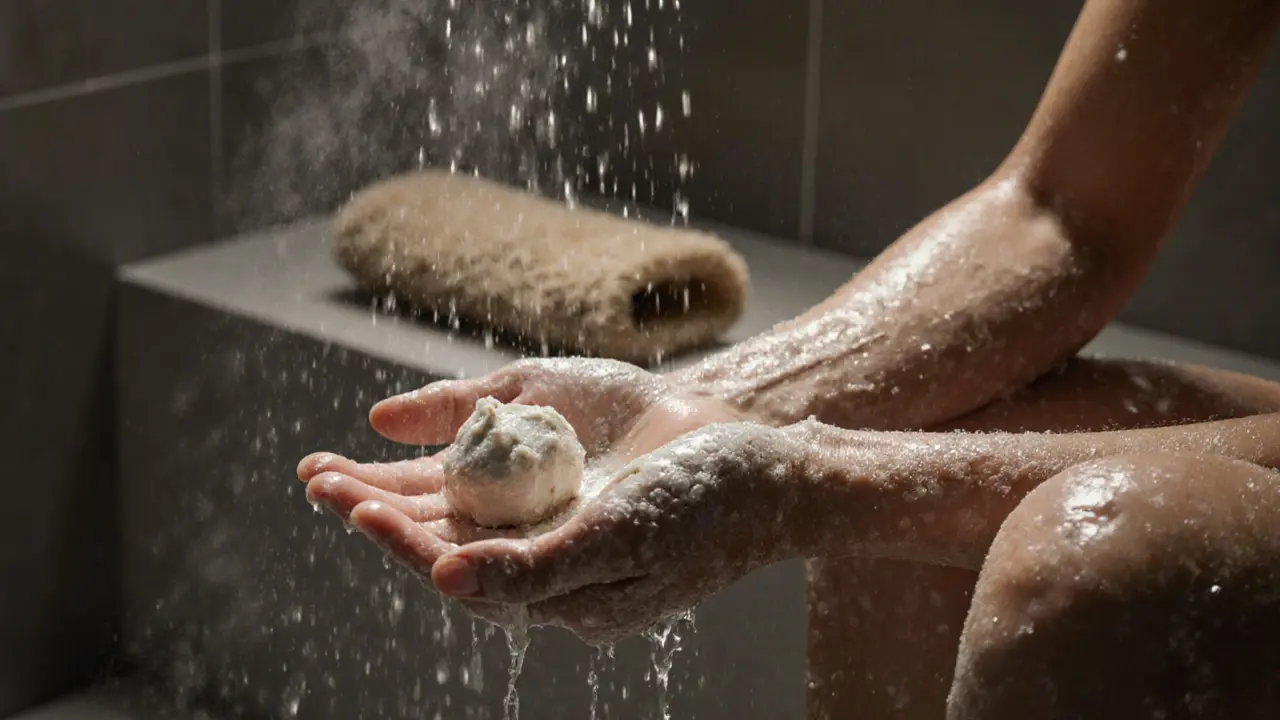
How to Apply Body Scrub Correctly
Setting Up for Success
Gather everything you need before you step into the shower: the scrub container, a soft washcloth (optional), and a moisturizer. A clean, clutter‑free space lets you focus on the process.
Choosing the Right Tools
For most users a simple handheld container works. If you love a spa vibe, a silicone brush or a natural loofah can provide extra grip. Make sure any tool you pick is easy to clean to avoid bacterial growth.
Step‑by‑Step Guide
- Start with a warm rinse to open pores.
- Apply a generous dollop of scrub onto your palm.
- Using gentle circular motions, massage the product onto damp skin. Focus on elbows, knees, and heels.
- Spend about 30 seconds per body area; avoid aggressive scrubbing.
- Rinse thoroughly with warm water until the skin feels smooth.
- Pat dry with a clean towel and immediately lock in moisture with a lotion or oil.
Tips for Beginners
If you’re new, start with a scrub that uses fine sugar particles and a mild fragrance. Test a small patch on your forearm to check for irritation before going full‑body.
Safety and Ethical Considerations
Choosing Qualified Products
Look for scrubs that list transparent ingredients, are cruelty‑free, and have a reputable manufacturer. Dermatologist‑tested labels add an extra layer of trust.
Safety Practices
Maintain good hygiene: store the scrub in a dry container, replace it every 3‑4 months, and never share personal containers.
| Practice | Purpose | Example |
|---|---|---|
| Patch Test | Check for allergic reaction | Apply a pea‑size amount on forearm |
| Use Gentle Pressure | Avoid skin irritation | Circle motions with light hand |
| Store Dry | Prevent bacterial growth | Keep lid tightly closed |
Setting Boundaries
If you receive a scrub treatment at a spa, communicate your comfort level-whether you prefer a light massage or a firmer one. Clear dialogue keeps the experience pleasant.
Contraindications or Risks
Avoid scrubs if you have open cuts, severe eczema, psoriasis flare‑ups, or are under dermatological medication that makes skin photosensitive. In those cases, consult a dermatologist before exfoliating.
Enhancing Your Experience with Body Scrub
Adding Complementary Practices
Pair your scrub with a short dry‑brush session beforehand to boost circulation, or follow up with a calming facial mask for a full‑body spa day.
Solo vs. Partner Use
Doing it alone gives you full control over pressure and timing. With a partner, you can enjoy a shared relaxation moment-just make sure both parties are comfortable with the chosen pressure.
Using Tools or Props
Silicone massage pads, natural loofahs, or even a handheld electric exfoliator can add variety. Remember to clean tools after each use.
Regular Engagement for Benefits
Consistent exfoliation (once or twice a week) maintains smooth skin and prevents buildup. Over‑scrubbing can strip natural oils, so listen to how your skin feels and adjust frequency.
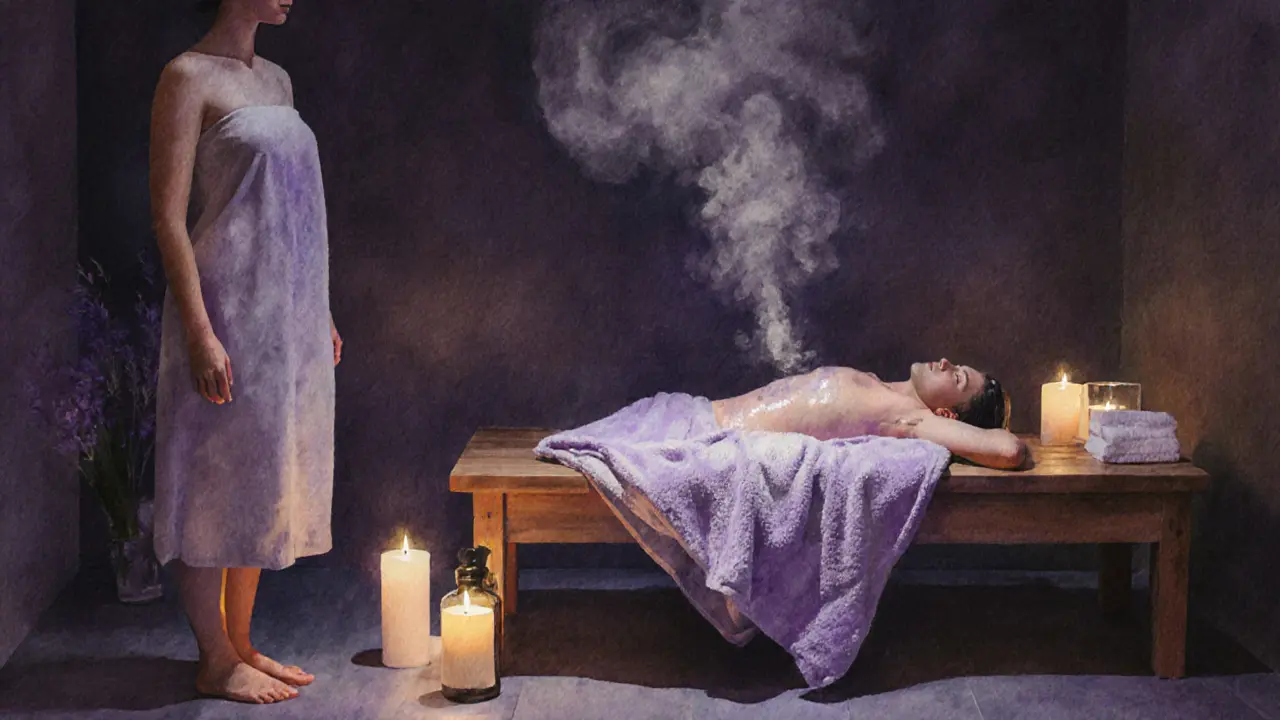
Finding Resources or Experts for Body Scrub
Researching Qualified Spa Therapists
Check certifications like the International Spa Association (ISPA) or local Dubai health authority listings. Reviews on platforms such as TripAdvisor can give insights into hygiene standards.
Online Guides and Communities
Websites like the American Academy of Dermatology, Reddit’s r/SkincareAddiction, and YouTube tutorials from licensed estheticians provide reliable tips and product recommendations.
Legal or Cultural Considerations
In the UAE, spa treatments must adhere to the Dubai Health Authority’s sanitation regulations. Certain traditional ingredients (e.g., camel milk) may be prevalent in local formulas, so verify any allergen concerns.
Resources for Continued Learning
Consider reading “The Skincare Bible” by Dr. Anjali Mahto, watching the “Skincare 101” series on Coursera, or attending a local wellness workshop focused on exfoliation techniques.
FAQ: Common Questions About Body Scrub
How often should I use a body scrub?
For most skin types, 1‑3 times a week is enough. Sensitive skin benefits from once a week with a gentle formula, while oily or athletic skin can tolerate up to three times.
Can I use a body scrub on my face?
Generally, no. Facial skin is thinner and more prone to irritation. Use a product specifically formulated for the face, such as a gentle facial exfoliant with micro‑beads or low‑strength AHA.
What’s the difference between a salt scrub and a sugar scrub?
Salt crystals are larger and more abrasive, making them great for calloused areas like feet. Sugar granules dissolve faster and are milder, ideal for overall body use and sensitive spots.
Is it safe to use a body scrub during pregnancy?
Yes, as long as you pick a gentle, fragrance‑free formula and avoid strong chemical exfoliants like high‑strength AHA. Always consult your OB‑GYN if you have specific concerns.
Can I make my own body scrub at home?
Absolutely. A simple DIY mix of 1 cup sugar, ½ cup coconut oil, and a few drops of essential oil creates an effective, natural scrub. Just store it in an airtight jar and use within a month.
Conclusion: Why Body Scrub is Worth Exploring
A Path to Radiant Skin
When done correctly, a body scrub not only smooths texture but also boosts circulation, enhances moisturizer absorption, and adds a moment of calm to your day. It’s a small routine with big payoffs.
Try It Mindfully
Start with a gentle product, listen to your skin, and keep the frequency in check. If you’re ever unsure, a quick chat with a dermatologist or a qualified spa therapist can set you on the right track.
Share Your Journey
Have you found a favorite scrub or a quirky DIY recipe? Drop a comment below, or follow the blog for more skin‑care tips and spa‑day ideas. Your experience could help the next reader fine‑tune their routine.
Some links may be affiliate links, but all recommendations are based on research and quality.

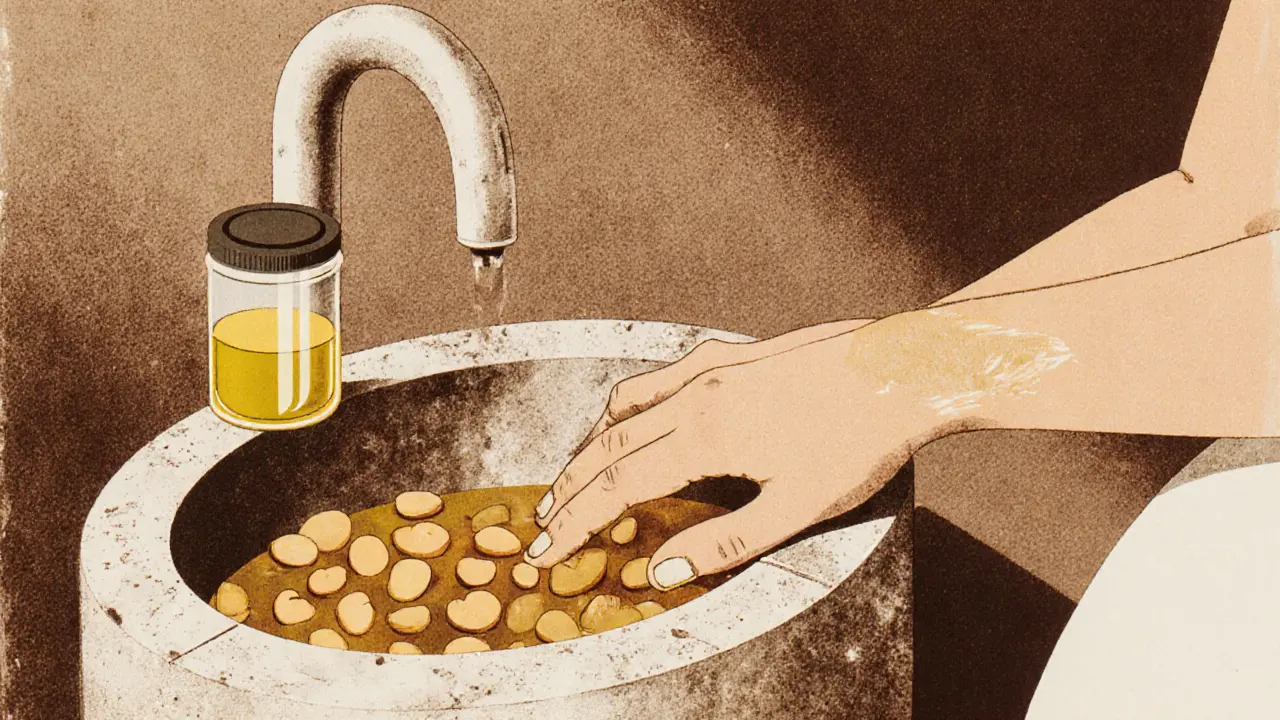
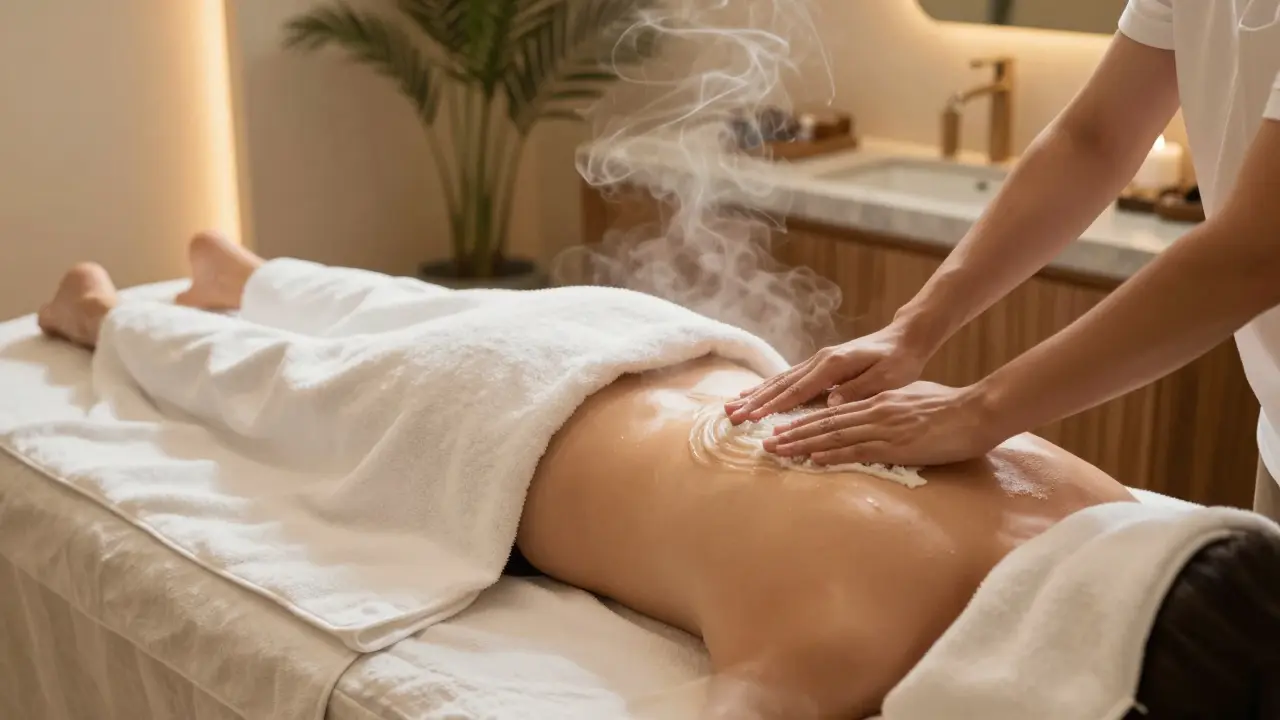
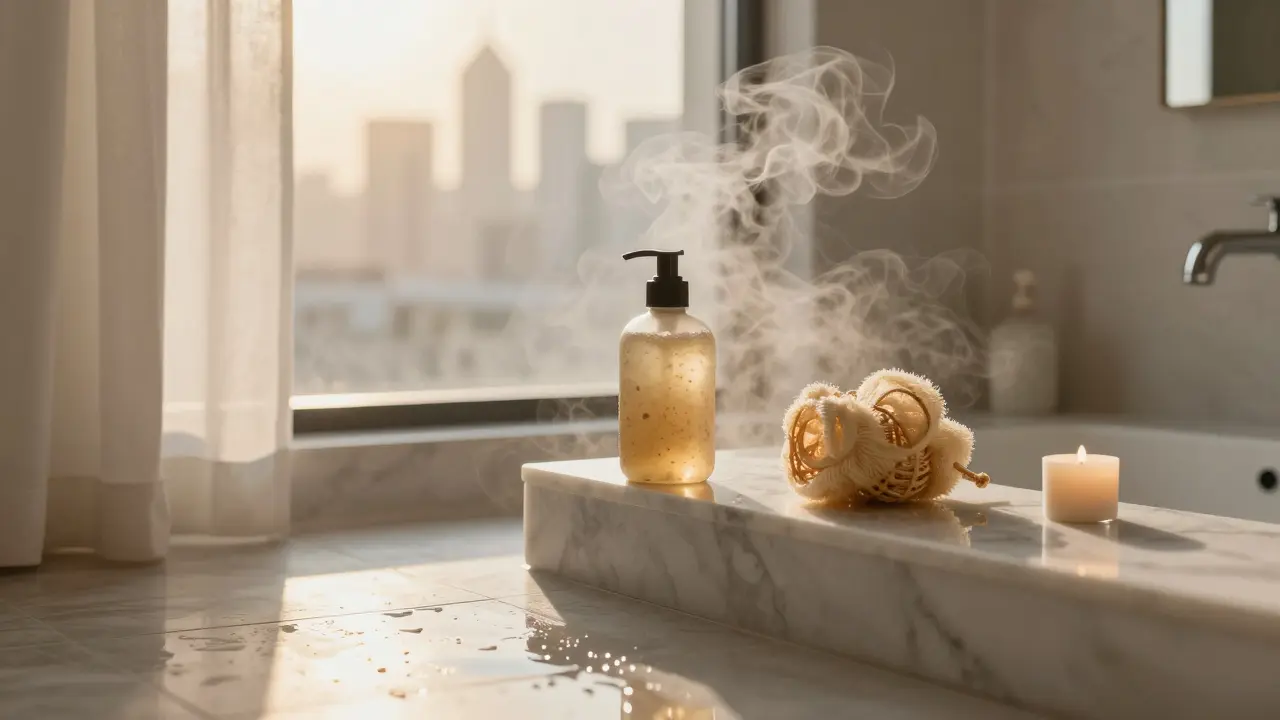

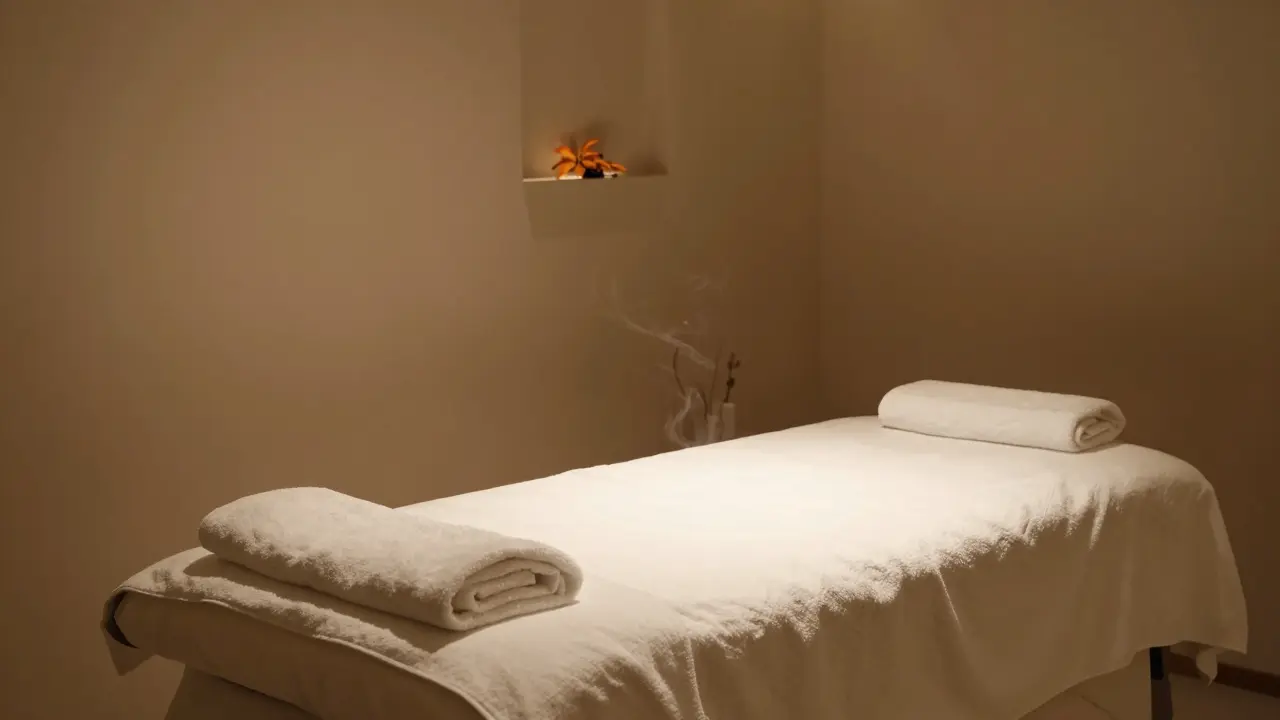
Julia McCarthy
October 21, 2025 AT 15:30Body scrubs can be a gentle ritual for anyone who wants softer skin. Start by picking a formula with fine grains if you’re new to exfoliation. Test a pea‑size amount on the inner arm and wait a few minutes for any irritation. Keep the water warm but not scalding so the particles glide smoothly. Move in circular motions, spending a minute on each area you want to smooth. Rinse thoroughly and follow with a light moisturizer to seal in hydration. Remember that consistency beats intensity, so a once‑a‑week habit is often enough. Your skin will thank you with a natural, healthy glow.
Piotr Williams
November 2, 2025 AT 17:13Wow, this guide is super detailed, incredibly thorough, absolutely packed with tips, and it really makes me want to try a scrub tonight!!!
Matt H
November 18, 2025 AT 22:06When you’re looking to boost skin turnover, integrating a body scrub into a weekly protocol can act like a micro‑mechanical resurfacing session. The abrasive vector (sugar, salt, coffee grounds) creates controlled shear forces that dislodge corneocyte clusters without compromising the lipid barrier. Pairing that with a high‑performance humectant such as squalane ensures rapid re‑hydration at the nanoscale. Think of it as a synergy between tribology and occlusion, where the frictional energy is converted into a biophysical stimulus for keratinocyte proliferation. In clinical terms, you’ll see an up‑regulation of filaggrin expression and a transient increase in transepidermal water loss that normalizes within 24 hours. For oily or athletic skin, a coarse sea‑salt matrix combined with niacinamide can temper sebum output while still delivering exfoliation. If you have a sensitive phenotype, downgrade to a fine‑granulated sucrose base and layer in a 0.5 % panthenol complex to soothe the epidermis. Timing matters: a 5‑minute manual massage at 38 °C maximizes pore opening and improves microcirculation, which in turn boosts delivery of subsequent actives. After rinsing, apply a barrier‑repair emulsion that contains ceramide NP and cholesterol to lock in the newly exposed lipid lamellae. From a formulation science perspective, the ideal pH for a scrub sits between 4.5 and 5.5 to preserve the acid mantle while still supporting enzymatic turnover. Avoid going beyond three applications per week, because cumulative mechanical irritation can precipitate transepidermal water loss and trigger compensatory hyperkeratosis. For best outcomes, rotate your exfoliation modalities-dry brushing on off‑days, chemical AHA peels bi‑weekly-to prevent tachyphylaxis and keep the skin’s response dynamic. Document your regimen in a simple log: date, product, pressure level, and any post‑application sensations; this data will guide adjustments over time. Many dermatology pros recommend a patch test on the forearm for 48 hours before committing to a full‑body treatment, especially when new actives are introduced. Ultimately, consistency, proper technique, and informed product choice turn a simple scrub into a high‑impact component of a full‑spectrum skin‑care strategy.
Ashok Sahu
December 6, 2025 AT 06:46In India we often add turmeric or sandalwood powder to our home‑made scrubs, which gives a warm earthy scent and extra anti‑inflammatory benefits. If you’re comfortable, try mixing a teaspoon of powdered chickpea flour with sugar and a dash of rose water for a gentle yet effective cleanse. Just make sure the mixture stays moist enough to glide, otherwise it can feel gritty on the skin. Also, many Indian spas use a warm herbal steam before the scrub, which opens pores and makes the exfoliation smoother. Respect your skin’s limits and adjust pressure – a light touch is usually all you need for a pleasant experience.
Vincent Jackson
December 23, 2025 AT 15:26Thats it – just be gentle and enjoy the smooth feeling afterwards.